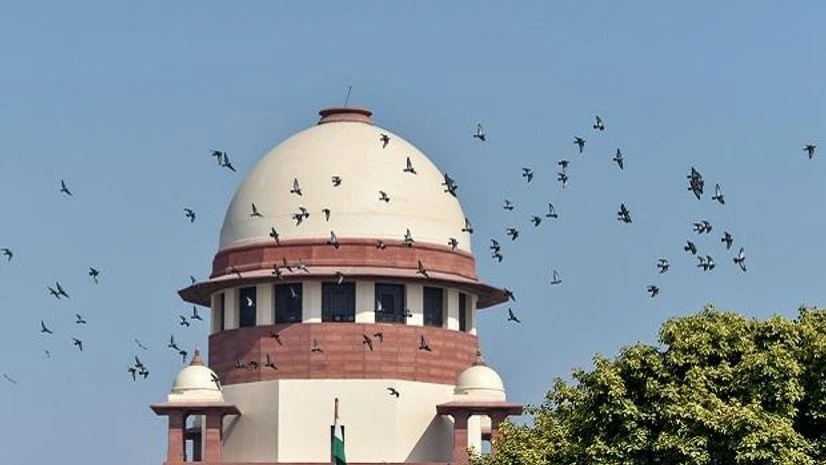Six petitions were filed in the Supreme Court on Friday seeking review of its November 9 judgement which cleared the way for construction of a Ram Temple at the disputed site in Ayodhya.
While five pleas have been filed by Maulana Mufti Hasbullah, Moulana Mahfoozur Rehman, Mishbahuddin, Mohd Umar and Haji Nahboob, who are all supported by the All India Muslim Personal Law Board (AIMPLB), the sixth one has been filed by Mohammad Ayub.
A 5-judge bench, headed by the then Chief Justice Ranjan Gogoi, had in a unanimous verdict on November 9 decreed the entire 2.77 acre disputed land in favour of deity 'Ram Lalla' and also directed the Centre to allot a 5-acre plot to Sunni Waqf Board for building a mosque in Ayodhya.
"At the outset, it must be stated that the purpose of this review petition is not to disturb the peace of this great nation but in the spirit that any peace must be conducive to justice. In respect of this case, Muslims have always maintained the peace but Muslims and their properties have been victim of violence and unfairness treatment. This review is part of a quest for justice," said one of the review pleas.
These five review petitions, which are settled by senior advocates Rajeev Dhavan and Zafaryad Zilani, have been filed through advocate M R Shamshad.
Dhavan, who represented Muslim parties in the Ram Janmabhoomi-Babri Masjid title dispute case, had on December 3 said he has been sacked from further appearance and is no longer involved in the plea for a review.
"Just been sacked from the Babri case by AOR (Advocate on Record) Ejaz Maqbool who was representing the Jamiat. Have sent formal letter accepting the 'sacking' without demur. No longer involved in the review or the case," Dhavan had wrote on Facebook.
More From This Section
As Dhavan had later said he did not want to divide the Muslim parties, the AIMPLB had said on December 3 that it was hopeful that the veteran lawyer will represent the body when it files a review petition.
On December 2, the first plea seeking review of Ayodhya verdict was filed in the apex court by Maulana Syed Ashhad Rashidi, legal heir of original litigant M Siddiq and also the Uttar Pradesh president of the Jamiat Ulama-e-Hind.
Rashidi stated in his review plea that "complete justice" could only be done by ordering reconstruction of the Babri Masjid.
While key litigant, Uttar Pradesh Sunni Central Wakf Board, decided against challenging the verdict, Maulana Syed Ashhad Rashidi has sought review of the verdict on 14 counts.
The mosque was demolished on December 6, 1992 by 'kar sewaks' triggering communal riots.
In his review plea which was filed on Friday, Maulana Mufti Hasbullah said the top court should reconsider the "grave injustice" to a community in a title suit.
"Title could not have been given to Hindu parties on the basis of exclusive possession of entire site which never existed at any point in time with the Hindus since it is admitted that Muslims entered and prayed at the site till December 1949, and later prevented from doing so because of the attachment while unfairly permitting Hindu worship following criminal trespass," Hasbullah said in his plea.
The plea said the November 9 verdict "condones serious illegalities of destruction, criminal trespass and violation of rule of law including damaging the Mosque and eventually destroying it".
"The judgment erred in accepting the juristic personality of the idol entitled it to the 3 domed structure and the courtyard while holding that the idol was illegally and forcibly put there. An idol as deity cannot be simultaneously illegally placed and legally valid to claim the title," the plea said.
It said since it is undisputed that Muslims were praying on the site till December 16, 1949 and entered the Mosque through the outer courtyard, this fact proves that the Hindus were never in exclusive possession.
"The court erred in not considering that there was a dedication of the mosque which was self-evident from the inscriptions," it said, adding, "the judgment erred in holding that the waqf was not established by 'user' though continuous possession and prayer were shown at all times."
"It also wrongly assumed that prayers did not take place at mosque before 1857 but used 1857 onwards alone as relevant," one of the review petitions said.
It further said, "The judgment under review erred in allotting alternate land of 5 acres to the Sunni Waqf Board under Article 142 even though the same was not pleaded for."
The review petition, filed by Ayub, said the November 9 verdict relies upon "patent errors and create rights based on illegal acts which is incorrigible in light of settled law".
In the first review plea, Rashidi has sought an interim stay on operation of the verdict in which it had directed the Centre that a trust be formed within three months for construction of the temple at the site.
Rashidi has also questioned the direction asking the Centre and the Uttar Pradesh government to allot 5 acre land for construction of a mosque at a prominent place in Ayodhya, saying that such a prayer was never made by the Muslim parties.
It was also submitted that despite acknowledging several illegalities committed by the Hindu parties, including the destruction of the mosque at the disputed site, the apex court condoned them and granted the land to them.

)
